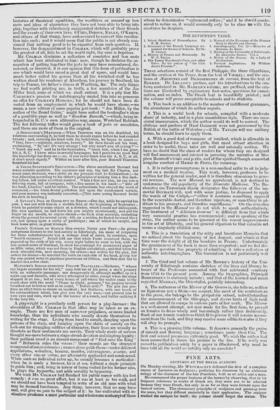THE REVIEWER'S TABLE.
E. H. Barker. Body in Health and Disease.
plained for the use of Schools. By Dr. Madame du Barri.
4. The Young Wanderer's Cave, and other Distinction.
dren's Fireside.", • Anderson.
THESE selections consist of the first Philippic, the three Olynthiacs, and the oration at the Peace, from the text of VCEMEL; and the ora- tions of YESCHINES and DEMOSTHENES de corona, from the text of BEKKER. Dr. LELAND'S preface, and his introductions to the ora- tion l contained in Mr. BARKER'S volume, are prefixed, and the ora- tions are illustrated by explanatory foot-notes, questions for exami- nation, and an index. The Greek text is beautifully printed ; and the volume will prove acceptable to schools and to students.
2. This book is an addition to the number of indifferent grammars, the abundance of which its author regrets.
3. This is a useful book for schools, compiled with a moderate share; of industry, and in a plain unambitious style. There are occa- sional inaccuracies, which the author would do well to correct. The chfiteau and gardens of Haut Goumont were not garrisoned by the British at the battle of Waterloo ;—if Mr. TAYLOR will use military terms, he should learn to apply them.
4. With a good deal of romance of incident, which is allowable in a book designed for boys and girls, that must attract attention in order to be useful, these tales are well and naturally written. We have no doubt that the class of readers for whom they are designed will find amusement and interest in perusing the narrative of Ste- phen Bancroft's trials and perils, and of the spirited though somewhat irregular conduct of Master de Florio, the runaway.
5. It is rather presumptuous in a non-medical critic to sit in judg- ment on a medical treatise. This work, however, professes to be written for the general reader, and it is therefore obnoxious to gene- ral censure. The new Manual, we apprehend, is not destined to undermine the old popularity of the Domestic Medicine. The Bu- • chanites (as THEODORE Hoosc designates the 'followers of the im- mortal BUCHAN) will, and with some justice, be disposed to apply the words of the Caliph,—" either it contains something opposed to the venerable doctor, and therefore injurious, or something in ad- dition to his precepts, and therefore superfluous." On the remedies 'suggested in the Manual we do not wish to speak authoritatively. The treatment of " delirium trenums" is different from that which very successful practice has recommended ; and in speaking of the stone, the author seems to be ignorant of the recent improvements in the art of lithotrity, and his general objection to that valuable art seems a singularly childish one.
6. This is a translation of the witty and licentious Memoirs that we noticed about the beginning of last August, and which at that time were the delight of all the boudoirs in France. Unfortunately the genuineness of the book is more than suspected ; and we feel dis- posed to question the propriety of admitting it into a collection of authentic autobiographies. The translation is not particularly well made.
7. The third and last volume of Mr. BOWER'S history -of the Uni- versity of Edinburgh contains sketches of the lives and literary la- bours of the Professors connected with that celebrated seminary from 1756 to the present year. Among the biographies, Principal ROBERTSON'S is curiously minute ; and that of the learned and much regretted MURRAY, the Orientalist, painfully interesting.
8. The authoress of the Mirror of the Graces is, she tells us, neither an Epicurean nor a Stoic—we suspect, like most of the contributors to the press, she belongs to the peripatetic school, notwithstandine- the announcement of the title-page, and divers hints of high rai& that are allowed to escape in various parts of her work. The Mirror is a well-meant attempt, not now made for the first time, to prevail on females to dress wisely and becomingly rather than fashionably. Such of our female readers as think fit to peruse it will receive amuse- ment from the task, and they may receive some edification also if they will obey its precepts.
9. This is a pleasing little volume. It deserves generally the praise of smooth and flowing language ; sometimes more than this. The first and second poems are extremely good. We wish the author had been counselled to throw his preface in the fire. If he really was moved to publication solely by a paper in Blackwood, why need he have told all the world so notably silly an anecdtite ?


















 Previous page
Previous page